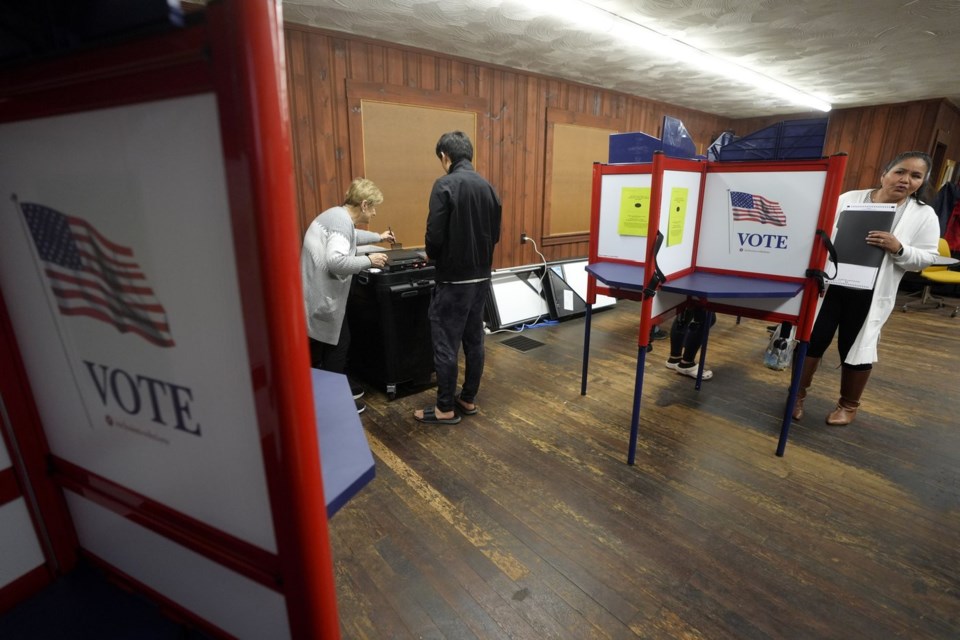BOSTON (AP) ŌĆö Massachusetts voters approved giving for ride-hailing companies such as Uber and Lyft but rejected a measure to .
The issues were among five measures on TuesdayŌĆÖs ballot. Voters also said no to increasing the minimum hourly wage for workers who collect tips. But they approved dropping comprehensive tests as a requirement for getting a high school diploma and OK'd auditing the Legislature.
Approved: allowing Uber, Lyft drivers to unionize
Voters approved giving the right to unionize to drivers for ride-hailing companies such as Uber and Lyft.
Under federal law, the drivers are considered independent contractors who donŌĆÖt have the right to unionize. The ballot measure approved by voters allows drivers to unionize in Massachusetts but doesn't require them to participate. On the corporate side, companies will be allowed to join forces through associations that would represent their joint interests in negotiations.
As part of the measure, the state will have the right to approve negotiated contracts. The proposal also creates a hearing process when a company or union is charged with an unfair work practice.
Unions pushed for the change despite a by the state attorney generalŌĆÖs office guaranteeing Uber and Lyft drivers earn a minimum pay standard of $32.50 per hour.
Opponents said the measure will raise prices for riders without directly benefiting drivers and create what they call ŌĆ£a new radical labor categoryŌĆØ inconsistent with federal labor law. Critics also say drivers already enjoy benefits, including higher hourly pay and paid sick and family medical leave.
Defeated: raising the minimum wage for tipped workers
Voters defeated a proposal to gradually increase how much employers must pay workers who collect tips, such as servers in restaurants.
The stateŌĆÖs wage for tipped workers is now $6.75 an hour, while the for most other workers is $15. Now, if a worker doesnŌĆÖt earn enough in tips to bring them up to $15 an hour, the employer must make up the difference.
Under the proposal, employers would have been required to pay tipped workers $9.60 an hour beginning Jan. 1, and match the stateŌĆÖs full minimum wage at the start of 2029.
Supporters argued that tips should be a reward for good service, not a subsidy for low wages.
James Rooney, president of the Greater Boston Chamber of Commerce, said the group had heard from waitstaff, bartenders, and restaurant owners that the question would hurt the hospitality and restaurant industry.
Defeated: legalizing psychedelics
The rejected ballot issue would have allowed residents 21 and older in certain circumstances. have legalized some mind-altering drugs that are considered illegal by the federal government.
The psychedelics in question included psilocybin and psilocyn, both found in so-called magic mushrooms; and mescaline, dimethyltryptamine and ibogaine from plants.
Critics of the proposal warned it could lead to a black market. They also argued that the centers selling the drugs would not be prevented from giving psychedelics to people considered high risk, such as those with schizophrenia, bipolar illness or who are pregnant or breastfeeding.
Approved: dropping a requirement to pass tests for a high school diploma
Until now, Massachusetts students were required to pass comprehensive tests to receive a high school diploma. The approved ballot issue doesn't get rid of the tests, but stipulates that passing them will no longer be required for graduation.
The Massachusetts Comprehensive Assessment System tests are given in mathematics, science and technology, and English.
Instead of passing the tests, students will be required to finish coursework certified by the local school district and achieve state academic standards in the subjects.
Massachusetts Teachers Association President Max Page said Massachusetts voters ŌĆ£have proclaimed that they are ready to let teachers teach, and students learn, without the onerous effects of a high-stakes standardized test.ŌĆØ
Supporters of the tests argued that without the requirement, school districts will adopt lower standards so students can graduate. They said itŌĆÖs unfair to grant diplomas to students who arenŌĆÖt ready.
Gov. Maura Healey, who opposed the question, said Wednesday that the state Department of Elementary and Secondary Education will come up with guidance for communities on the change.
Approved: allowing an audit of the state Legislature
Voters gave the state auditor the power to audit the Legislature.
The ballot measure had been spearheaded by state Auditor Diana DiZoglio, who formerly served in both the state House and Senate. She said passage is a victory for those who want more open state government.
ŌĆ£The people of Massachusetts want the equity, transparency and accountability that a legislative audit would bring,ŌĆØ she said.
Critics had said the question would violate the separation of powers outlined in the Massachusetts Constitution.
Democratic Senate President Karen Spilka and House Speaker Ronald Mariano released a statement saying they will consider ŌĆ£how to best respect the Question 1 election results in a manner that aligns with the fundamental principles of the Massachusetts Constitution, including separation of powers.ŌĆØ
___
Associated Press journalist Nick Perry contributed to this report from Meredith, New Hampshire.
Steve Leblanc, The Associated Press




